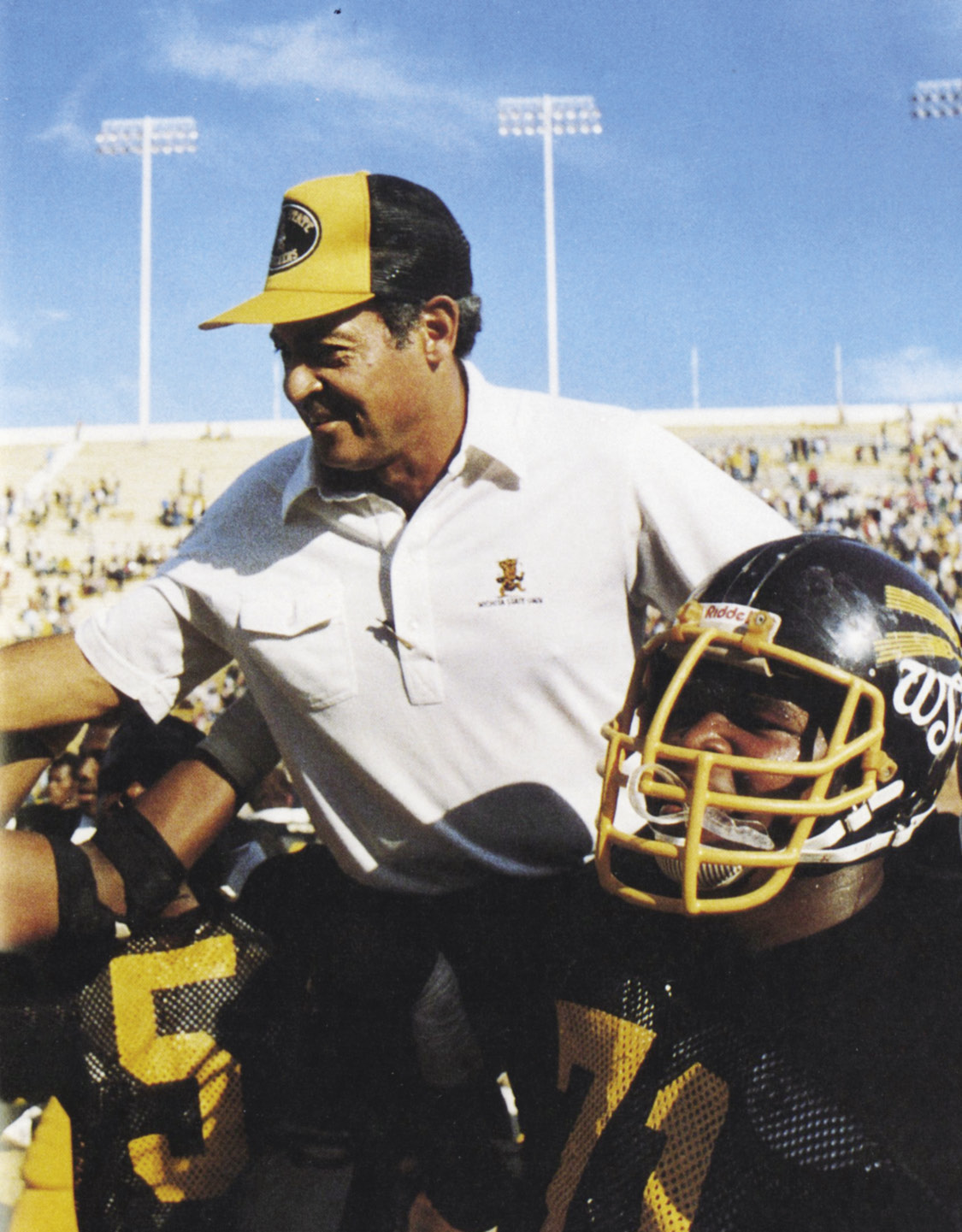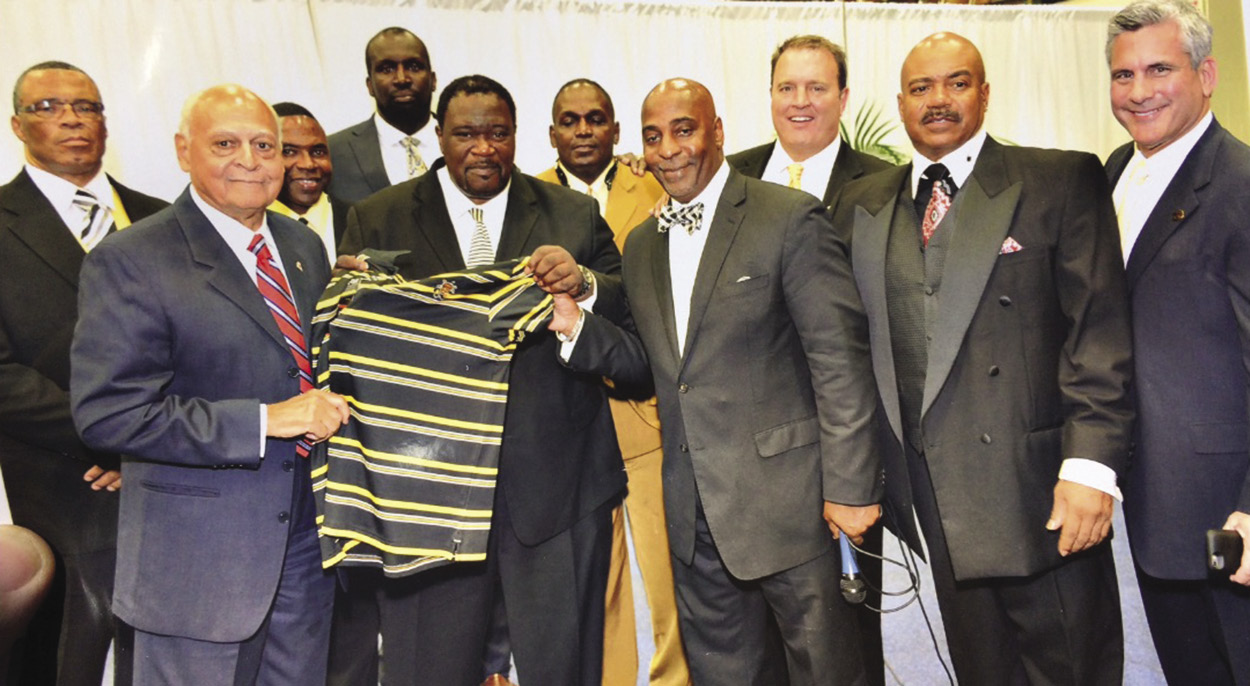
There’s one particular story that Willie Jeffries loves to tell whenever he’s asked about the immense challenges that he faced after he was hired by Wichita State in 1979 as the first black head football coach at a Division I university.
Likely mindful that critics worried openly that he would turn the program into the “Grambling of the Plains,” Jeffries was in the living room of a white recruit in Pennsylvania. The parents served cookies and hot chocolate while Jeffries made his pitch, trying to sell the player on becoming a Shocker.
Midway through the meeting, the young man surprised Jeffries by flatly turning down the scholarship offer — not because of WSU’s lack of football tradition, which would have been the most likely, and, quite frankly, understandable reason, but because he couldn’t see himself playing for a black coach.
“Well,” Jeffries told the young man, “I’m certainly glad I found this out before it was fourth and one.”
In October, Willie Jeffries Weekend was celebrated at South Carolina State, where Jeffries enjoyed his greatest successes, compiling a 128-77-4 record during two stints as the head coach and winning seven conference titles and three Black College National Championships. Officially called “Honoring the Legacy of Willie Jeffries,” the special weekend at his alma mater was simply the latest accolade of many that have been bestowed on Jeffries, who is already a member of the College Football Hall of Fame.
But the SC State gathering surely provides the perfect reason to revisit his historic achievement as a pioneer in the coaching profession.
A group of Jeffries’ former Shocker players attended the festivities, and linebacker Mike Johnston ’84 spoke for the team during a formal gathering. In front of a mostly South Carolina crowd, the colorful Johnston hit all the right notes.

South Carolina State’s athletics department, in conjunction with the SC State
Former Athletes Association, during a special weekend of events held Oct.
16-17 in Orangeburg, S.C. Former Shocker football players in attendance
were Mike Johnston ’84, Billy Wilson fs ’82, Elwyn Holt fs ’84, Kelvin
Middleton ’88, James “Jumpy” Geathers fs ’84, Ron Horton ’90, Maurice
Foxworth ’86, Danny Jones ’81 and Jay Hull ’83. When Wichita State hired
Jeffries in 1979 from SC State, he entered the sports history books as the
first African American head football coach at a Division 1A university.
He explained WuShock, Wichita State’s “goofy mascot,” by sharing with the non-Shocker crowd the origins of the university’s Shocker nickname for its sports teams. “In the old days,” Johnston related, “farmers would cut the wheat with a scythe and make bundles of Shocks of wheat.”
He called Jeffries “a leader of men and a father to many.”
And he told humorous stories about Jeffries, explaining how “Coach was funny even when he was mad.” Johnston can still clearly picture a fed-up Jeffries, staring hard at the ground in the middle of a huddle, small pinch of tobacco in his cheek, berating the team for not practicing hard enough. He wanted to hear the sounds of pads crunching. “Y’all ain’t hittin’ out there! It sounds like rats pissin’ on cotton!”
Although two other black candidates turned down the head coaching position at Wichita State, Willie Jeffries was undoubtedly the right man for such a historic moment.
Growing up in tiny Union, S.C., Jeffries learned about the value of hard work and the sting of segregation. He was born in 1937, and his father passed away when he was only 4; Jeffries got a job as a caddy at an all-white country club to help his mother make ends meet.
He began his head coaching career at Granard, the black high school in Gaffney, S.C., and led the team to three state championships and a 64-8-2 record. The success did not occur under the famed Friday night lights, however, as Granard played its games on Thursdays so Gaffney, the white school, could use the field on Fridays.
Jeffries paid his dues as an assistant coach at the collegiate level, including a stop at Pittsburgh, where he helped recruit an outstanding freshman class (including Tony Dorsett) that won a national championship four years later.
Then came the success at South Carolina State (50-13-4, five conference titles) that would earn Jeffries a call from WSU Athletic Director Ted Bredehoft and the opportunity to make history.
Interestingly, Jeffries says that he simply viewed the Wichita State position as a well-deserved promotion.
“We couldn’t do any better at South Carolina State,” Jeffries told The Shocker in mid-November. “I wanted to be like Daniel Boone and Lewis and Clark and go explore. I didn’t realize until the press people started calling and saying that I was the first black head coach, and that maybe I could open the door for others. Once I realized the pressure I had for winning, it was a lot on my shoulders, to tell you the truth.”
While Jeffries may not have fully realized the significance of the moment, others certainly did. Headlines from the time of his hiring reveal that much of the focus was on his color, not his already impressive list of accomplishments.
Read two newspaper headlines:
“WSU Hires Black Head Coach”
“Wichita State Hires Black to Run Football Program”
The intensity of the spotlight on the 42-year-old Jeffries was immense. Herman Boone, the black high school football coach made famous in the movie “Remember the Titans,” compared Jeffries’ role in sports and society to that of Jackie Robinson.
It’s certainly understandable if Coach Jeffries didn’t allow himself to appreciate the enormity of the moment when he was hired at Wichita State. Because an enormous challenge was ahead — Shocker football had produced only one winning season in the previous 15.
Progress was steady. Jeffries is rightly credited with improving the talent level at Wichita State, evidenced by the fielding of such players as James “Jumpy” Geathers fs ’84, a massive defensive end who would play in the NFL, and Prince McJunkins ’86, a dual-threat quarterback who made history of his own as the first player in NCAA history to rush for 2,000 yards and pass for 4,000.
But, as former offensive lineman Jay Hull ’83 stresses, how Jeffries treated and coached those superior athletes is why he was able to put Shocker football on more solid footing. “Coach Jeffries cared about you as a person,” Hull says. “He would always ask how you were doing, ask you how your parents were doing. He took a sincere personal interest in everybody. That means a lot. It made you want to play hard for him.”
In season four of Jeffries’ tenure, the Shockers enjoyed a breakout season. WSU went 8-3 in 1982, including a 13-10 victory over the Kansas Jayhawks — a victory the city proudly celebrated on billboards and T-shirts all over town.
Casey Scott covered the Shockers for the Wichita Eagle during part of Jeffries’ tenure before joining the athletic department. He credits Jeffries for restoring “relevance” to the program.
“What do most people remember when they think of Shocker football? They think of the plane crash in ’70; that was a real setback for the university and, really, the entire community. Willie had an engaging personality, and because of that and some of the athletes he brought in and the offense he ran, I think he brought some excitement back to a program that really had a pall cast over it for quite a few years.”
Willie Jeffries, now 78, says with pride that he’s still active professionally four or five days a week. He does speaking engagements and helps raise funds for South Carolina State.
Looking back on his time at WSU, Jeffries says he appreciates the support he received from AD Bredehoft and university president Clark Ahlberg ’39. Unprompted, he mentions the NCAA probation for recruiting violations that clouded his history-making tenure at Wichita State before his resignation after a 3-8 season in 1983.
“I’ve got no regrets,” he says. “I really wish 1,000 times over that those violations hadn’t taken place. I really wish that. But we truly loved our time in Wichita. You know, of all the places we’ve been, Wichita is one of our favorites.”
Shocks of the Dinner Table
• Coach Jeffries had the perfect recipe for keeping some of the out-of-state Shockers happy. He recalls having defensive end Jumpy Geathers fs ’84, along with basketball players Cliff Levingston fs ’84 and Xavier McDaniel ’96, over for dinner. (Antoine Carr fs ’83 would show up, too, even though he was from Wichita.) “If they got homesick, they knew that every Sunday my wife would be cooking up a pot of pig’s feet,” Jeffries says. “We’d have a great big pot of those, plus collard greens and potato salad and cornbread. Those guys would just dig in. It was great. We knew how important it was to make somewhat of a home environment to keep them happy on the plains of Kansas.”
• A little-known fact is that Jeffries helped land McDaniel, one of the best basketball players in school history, because they shared the South Carolina connection. McDaniel attended A.C. Flora High School in Columbia, and Jeffries was good friends with his coach. Most recruiters were after McDaniel’s teammate, Tyrone Corbin. “We were able to get X no problem,” Jeffries says. “We just went in there and swooped him up.”
• According to the the Institute for Diversity and Ethics in Sport, the number of head football coaches of color at the FBS level decreased from 15 in 2013 to 14 at the start of the 2014 season. Nearly 89 percent of head coaches were white. Jeffries isn’t pleased with those numbers, but he did note that black men are getting jobs at power schools, such as Charlie Strong at Texas. “The numbers aren’t quite enough at all, but the jobs are better,” Jeffries says. “We’re getting a chance to fight with a 2-by-4 and not with a toothpick.”
• Wichita State was placed on probation for the 1983 and 1984 seasons because of violations that occurred under Jeffries. Still, most fans seem to have positive memories of Jeffries. “I think that because of the way Willie went on about his life and his career and continued to make differences in the lives of his players that most people tend to give him a pass on that,” notes Wichita Eagle columnist Bob Lutz, who covered WSU football during a portion of Jeffries’ tenure. “The fact that so many of his players still talk about him, still tell stories about him and clearly revere him says a lot for what a good football coach he was and, more than that, what a good man he is.”





